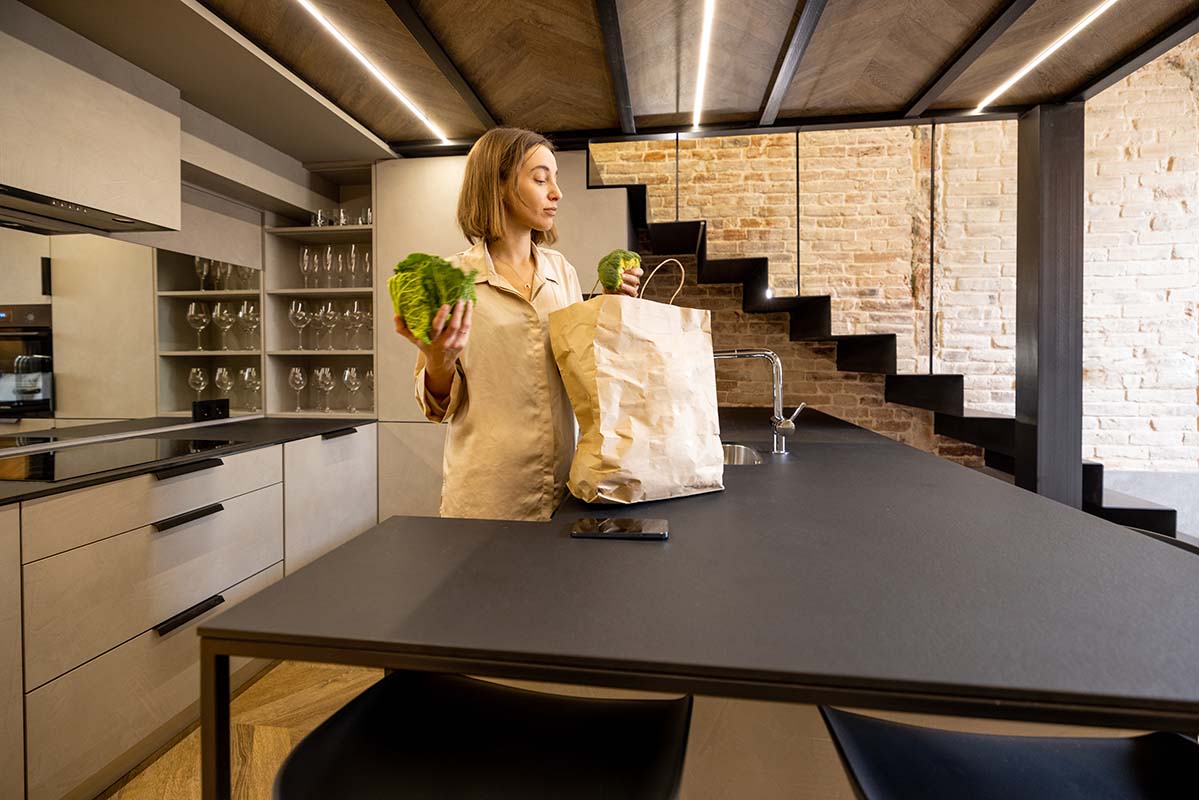Melvin is an expert for portable products.The site is for sharing everything about portable products for online buyers.
Yes, it is possible to have a kitchen in the basement.
Benefits Of Having A Kitchen In The Basement
Having a kitchen in the basement can provide several benefits. Firstly, it increases convenience and functionality, allowing for easier access to cooking facilities and storage. This is particularly beneficial if you have an additional living space downstairs, such as a guest suite or a recreation area, as it eliminates the need to constantly go upstairs for snacks or drinks. Secondly, having a basement kitchen can add valuable living space to your home. It provides an opportunity to create a cozy and inviting area for family gatherings or entertaining guests. Additionally, if you are considering generating some extra income, a basement kitchen can offer potential rental opportunities. Renting out a basement suite with a kitchenette can attract tenants who are looking for a self-sufficient living space. Overall, having a kitchen in the basement can enhance the functionality and value of your home, making it a convenient and practical addition.
Considerations Before Building A Basement Kitchen
Considerations Before Building a Basement Kitchen
Assessing available space is the first step in determining whether you can have a kitchen in the basement. Measure the area and ensure it meets your needs in terms of size and layout. Checking local building codes and regulations is crucial to ensure compliance and obtain any necessary permits. Different areas have specific requirements regarding basement kitchens.
Evaluating plumbing and electrical requirements is also essential. Plumbing and electrical systems may need to be extended or modified to accommodate a basement kitchen. Consult with a professional to assess the feasibility of these changes and determine the potential costs involved. It is important to ensure the existing systems can handle the additional load.
By carefully considering available space and evaluating plumbing and electrical requirements, you can determine if having a kitchen in the basement is feasible and plan accordingly.
Creating A Functional Basement Kitchen Design
When designing a basement kitchen, it’s important to create a functional space that maximizes the available area. Utilizing space-efficient layouts is key to making the most of the basement’s limited space. By carefully planning the placement of appliances and fixtures, you can ensure that the kitchen is both practical and visually appealing. Consider opting for compact appliances that are specifically designed for smaller spaces. These appliances not only save space but also offer the same functionality as their larger counterparts. Additionally, maximizing natural light and ventilation is essential in preventing the basement kitchen from feeling dark and cramped. Installing windows, using light-colored cabinets and countertops, and incorporating strategic lighting can help brighten up the space. With thoughtful design choices, you can indeed have a fully functional kitchen in your basement.
Plumbing And Electrical Considerations For A Basement Kitchen
When designing a basement kitchen, it is important to carefully consider the plumbing and electrical requirements to ensure a safe and functional space. The installation of proper drainage and water supply is crucial to avoid any potential issues such as leaks or flooding. This may involve hiring a professional plumber to assess the existing plumbing system and make any necessary modifications.
In addition to plumbing, ensuring adequate access to electrical outlets is essential for a basement kitchen. This may involve adding new outlets or relocating existing ones to meet the needs of the kitchen appliances.
However, there can be potential challenges when it comes to basement kitchens. Limited natural light and ventilation may need to be addressed through the installation of artificial lighting and proper ventilation systems.
Overall, with careful planning and consideration of the plumbing and electrical requirements, having a fully functioning kitchen in the basement is definitely achievable. Professional assistance should be sought to ensure that all necessary codes and regulations are met to create a safe and efficient space.
Ventilation And Heating For A Basement Kitchen
Proper ventilation is crucial in a basement kitchen to ensure a healthy and comfortable environment. Without adequate ventilation, cooking odors, smoke, and moisture can accumulate, leading to unpleasant smells, mold growth, and potential health hazards. To address this, there are several types of ventilation systems that are suitable for basements.
| 1. Exhaust Fan | An exhaust fan is a popular choice for basement kitchens, as it helps remove odors, smoke, and excess moisture efficiently. |
|---|---|
| 2. Ducted Range Hood | A ducted range hood is another effective option. It is installed above the cooking area, and it vents the air outside, preventing odors and smoke from spreading throughout the basement. |
| 3. Window Ventilation | If your basement has windows, opening them while cooking can provide natural ventilation and allow fresh air to circulate. |
| 4. Dehumidifier | A dehumidifier is essential for controlling moisture levels, preventing mold, and maintaining a comfortable environment. |
In addition to ventilation, proper heating is also important to ensure a cozy basement kitchen. You can consider options like installing baseboard heaters, radiant floor heating, or extending your existing HVAC system to include the basement. These heating methods will help maintain a consistent temperature and create a pleasant cooking environment.

Credit: www.grundig.com
Waterproofing And Moisture Control In A Basement Kitchen
Addressing potential water leaks and moisture issues is crucial when considering a kitchen in the basement. Since basements are prone to moisture problems, proper waterproofing methods for walls and floors are essential. Applying a waterproofing sealant or coating to the basement walls can help prevent water penetration. Additionally, installing a drainage system, such as a sump pump, can redirect any water that enters the basement.
Preventative measures to avoid mold and mildew include ensuring proper ventilation in the basement kitchen. Installing exhaust fans and windows can help remove excess humidity and discourage the growth of mold and mildew. Adequate insulation and dehumidifiers can also assist in controlling moisture levels.
By implementing these waterproofing and moisture control strategies, homeowners can enjoy the convenience of a kitchen in the basement without the worries of water damage and potential health hazards associated with mold and mildew.
Safety Measures For A Basement Kitchen
When planning to have a kitchen in the basement, safety should be a top priority. Installing appropriate fire safety measures is essential to prevent and contain any potential fires. This includes having fire extinguishers readily accessible in the kitchen area and installing a smoke detector connected to the main home security system. It is crucial to incorporate proper lighting in the basement kitchen to ensure visibility and prevent accidents. Emergency exits should be strategically placed and easily accessible in case of an emergency. Additionally, it is imperative to ensure that the basement kitchen complies with safety codes set by local authorities. These codes will outline the necessary precautions to be taken in terms of electrical wiring, ventilation, and other vital aspects of safety.
Cost Considerations For A Basement Kitchen
Cost Considerations for a Basement Kitchen
Budgeting for materials and labor:
When planning a basement kitchen, budgeting plays a crucial role. Factors such as the type of materials used and the cost of labor can significantly impact the overall expenses. However, compared to renovating an above-ground kitchen, there is the potential for cost savings in a basement kitchen project.
Potential cost savings compared to above-ground kitchen renovations: Due to the existing structure of the basement, certain amenities like plumbing and wiring may already be in place, reducing the need for extensive work and lowering costs.
Considerations for long-term maintenance and upkeep: While the initial investment in a basement kitchen may be lower, it is important to consider the long-term maintenance and upkeep costs. Basements are prone to moisture and require proper insulation and ventilation to prevent issues such as mold or mildew. Allocating a budget for these requirements is essential to avoid future complications.
Legal And Insurance Implications Of A Basement Kitchen
Having a kitchen in the basement can be a convenient solution for many homeowners. However, it is essential to understand the legal and insurance implications of such a setup. Consulting with local authorities and insurance providers is crucial to ensure compliance with regulations and to avoid any potential liability issues.
When it comes to liability and coverage concerns, it is important to review your homeowner’s insurance policy and discuss any necessary adjustments with your insurance provider. They can advise you on the specific coverage requirements for a basement kitchen and help you understand any potential limitations or exclusions that may apply.
In addition, navigating permit and licensing requirements is necessary when establishing a kitchen in the basement. You may need to obtain permits for construction, plumbing, and electrical work, as well as meet certain health and safety standards. Consulting with local authorities can provide you with the necessary information and guidelines to follow in order to ensure compliance.
Overall, having a kitchen in the basement can be a viable option, but it is essential to take the necessary steps to address the legal and insurance aspects of this undertaking in order to protect yourself and your property.
Frequently Asked Questions Of Can You Have A Kitchen In The Basement
Can You Have A Kitchen In The Basement?
Yes, it is possible to have a kitchen in the basement. Many homeowners choose to convert their basements into functional living spaces, including kitchens. However, there are certain factors to consider, such as proper ventilation, plumbing, and legal requirements. Consulting with professionals is essential to ensure a safe and efficient basement kitchen setup.
Conclusion
Having a kitchen in the basement is a practical solution for maximizing space in your home. It provides convenience, functionality, and adds value to your property. With proper planning and design, you can create a basement kitchen that meets your needs and preferences.
Consider factors like lighting, ventilation, and plumbing to ensure a safe and comfortable space. Embrace the possibilities of a basement kitchen and explore the potential it holds for improving your living experience.

Melvin is an expert for portable products.The site is for sharing everything about portable products for online buyers.

